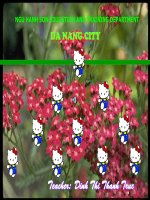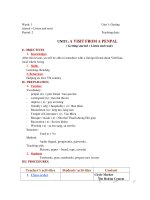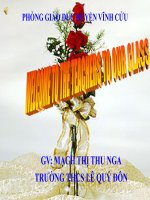UNIT 12 Getting started
Bạn đang xem bản rút gọn của tài liệu. Xem và tải ngay bản đầy đủ của tài liệu tại đây (93.1 KB, 4 trang )
<span class='text_page_counter'>(1)</span>Teacher: Nguyen Thị Hang - THCS Yen Nam - Duy Tien. UNIT 12: Robots Lesson 1: Getting started I. Objectives By the end of this lesson students can: + Use the lexical items related to the topic :" Robots" + Use “ could” and “ will be able to “ to express past and future abilyty. + Read for specific informationabout types of robots and their abilities … + Know the words to name everyday activities II. Main language 1. Vocabulary: - Robot, role, minor, role minor , hedge, laundry, human, ….. 2. Grammar: + Could for past ability + will be able to for future ability III. Teaching aids: - T: Textbook, pictures..... , survey questions - Ss: Textbook, sts' book. IV. Procedures : 1. Management: + Good morning. + How are you? +Who’s absent today? 2. Checking the old lesson 3. New lesson: Teacher and students' activities Content 1. Warm up( 3- 5’) - Give a picture of “ robot” -T writes " Robot" on the board. - Ask Ss what " robot" means to them. - T explains " robot" - In this unit we are going to learn about “ robot” - T asks Ss open their books and start the lesson. 2. Presentation( 8-10’) Ask students to look at the screen and observe 1. Listen and read the picture ( in the book ) and answer some questions + Where are Nick and Phong? + What might be happening to them ? + What are they doing? ( They are talking about robots) +Teacher introduces some new words by using * New words:.
<span class='text_page_counter'>(2)</span> picture on the slide or translates into - Robot(n) : người máy Vietnamese. - role( n): vai trò - minor(adj): nhỏ, thứ yếu. Minor role: vai trò thứ yếu. - Human( adj): con người - T introduces * Grammar: + Could for past ability and Will be able to + Could for past ability for future ability In the past they had a minor role. They by sentences in part 1 could do very simple things. - In the past they had a minor role. They could + Will be able to for future ability. do very simple things. Ex: They will be able to do many things - They will be ableto do many things like like humans. humans. They won’t be able to do things like play They won’t be able to do things like foot ball or drive a car play football or drive a car - Ss can give some examples with Could for past ability and Will be able to for future ability - Ss read all new words aloud. - Have some Ss to read in front of the class. - Asks students to guess their conversation - - T asks some questions on the sile. - Have the students open their books and listen to the tape T: plays the tape and students listen and read - Ss listen to the recording ( twice) T asks some Ss about the guess questions on the sile. - Have some pairs to read the dialogue in front of the class. - T asks Ss to read the part a 3. Practice( 17- 20’) - Ss listen the dialogue again a. Read the conversation again . Give example on the sile. 1. What could Answer the following questions. robots do in the past? -They could do very simple things. 1. They could only do very simple - Ss work individually to answer the questions things. - T allows Ss to share answers before doing in front of the class.One asks and one answers. 2. Yes, they can - Ss write the correct answers on the board. 3. They will be able to do many things - T corrects . like humans - T asks Ss to read the conversation again 4. No, they won’t.
<span class='text_page_counter'>(3)</span> T: have sts observe things on the picture on the sceen (slide) - Asks sts to name the thing they see - T asks them to find out four types of robots in the conversationand write them under the correct pictures -Call 2 pupils to go to the black boad and write - Have some Ss to do in front of the class. - T corrects them. * Give the new words. Let pupils read two times. - T introduces the exercise 2. T: have sts observe things on the picture on the screen (slide) -Have Ss quickly match each activity with its picture . - Ss play the recording for Ss to check their answers, - T corrects their pronounciation. - T asks : Do you often do the dishes ? How often do you cut the hedge? - Ss answer . - Let ss play in groups. - Correct. - T introduces the exercises 3 and demonstrate the game to the class first - Asks a more able S to help you Let pupils play in groups. - T corrects.. b.Find the four types of robots in the conversation. Write them under the correct pictures below 1. teaching robots 2. worker robots 3. doctor robots 4. home robots. 2. Match the activities with te pictures. Then listen, check and repeat the phrases. 1. c b.. 2.d. 3. a. 4.. 3. Game: Miming Work in groups. A student mimes one of the activities in 2 and the others try to guess. Then swap. Example: A: what am I doing? B: You’re doing the dishes. A. Yes, that’s right/ No, try again. 4. Look at the pictures. Tell your partner what you can or can’t do now Example: I can draw./ I can’t swim.. - T introduces the exercises 4 . - T: have sts observe things on the picture on the screen (slide) - Asks the students repeat the example in pairs. - T can explain the meaning if necessary. a. I can play football /I can’t play - Teacher explains the use and help ss football. remember the use of can to talk about ability b. I can climb a mountain./I can’t in the present and have some ss give examples. climb a mountain./ of modal “can”: We use can to talk about c. I can play the guitar/I can’t play the ability in the present. guitar. - Asks a more able to tell what activities in the d. I can sing an English song./ I can’t pictures he/ she can or can’t do. sing an English song..
<span class='text_page_counter'>(4)</span> - Asks the pupils to do the exercises. Ss work in pairs . - T goes around to help weaker ss. - T: have sts observe things on the picture on the screen (slide) - Asks Ss to work in pairs( free) . - T corrects. - T introduces the exercises 5 . - T: have sts observe table on the screen (slide). - Asks Ss to move around and ask different classmates different questions - Ss go around the class asking the questions. - Asks Ss to report the results. - Counts the number of Yes answers to each question and find uot which sports or gamesall Ss can play…. 4. Consolidation( 5-7’’) -Asks pupils do individually exercises - Have some Ss to writer their answers on the survey questions notes. - T collects them. -Sum up 5. Homework(3’) - Learn by heart the new words and grammar. - Do ex 1,2,3,4 in the textbook( page – 40, 41). - Prepare the new lesson:” a closer look 1”. e. I can + V…./ I can’t+ V….. 5.Class survey: Teacher go around the class asking these questions . Find out: - The sports or games that all people can play. -The sports or games that some people can not play. - The sports or games that no one can play.. Remarks: .................................................................................................................................................. ........................................................................................... Date:............................
<span class='text_page_counter'>(5)</span>









